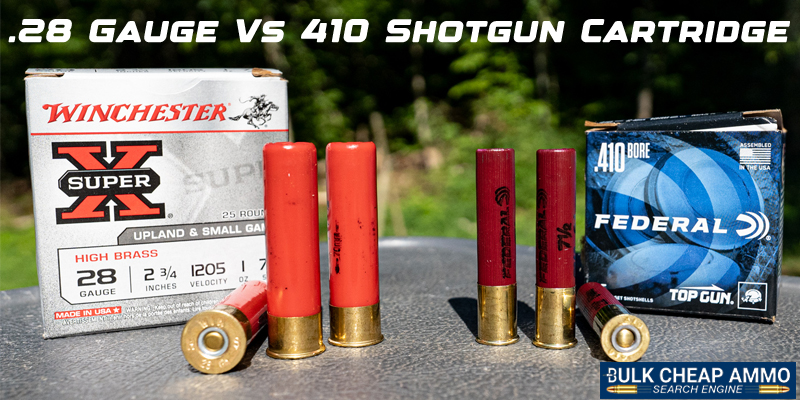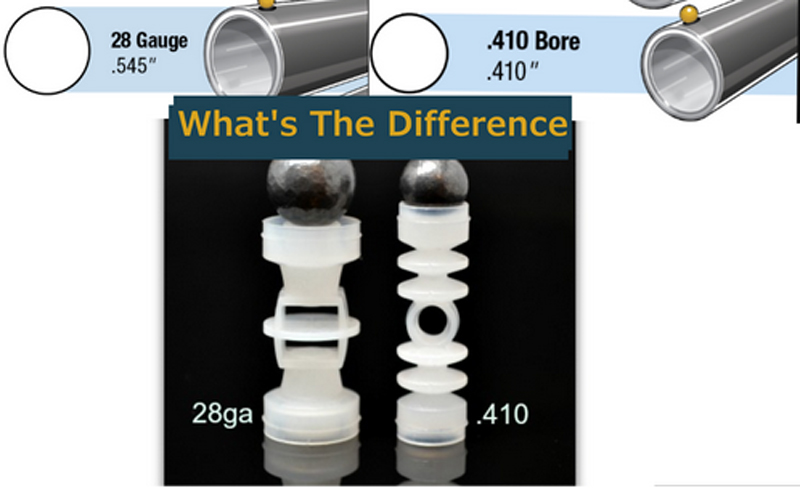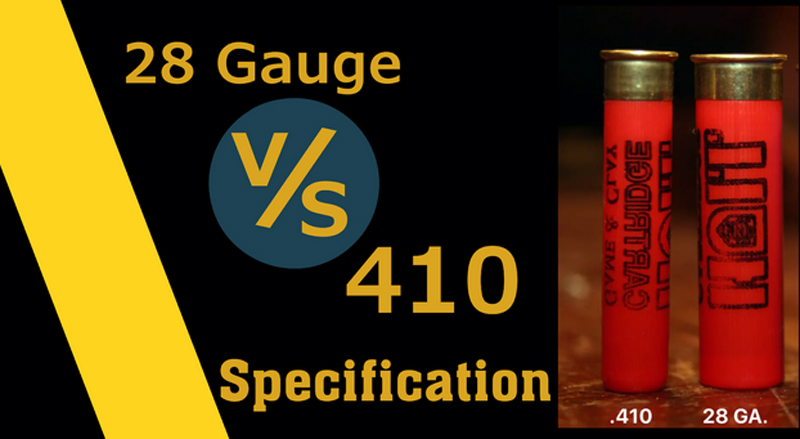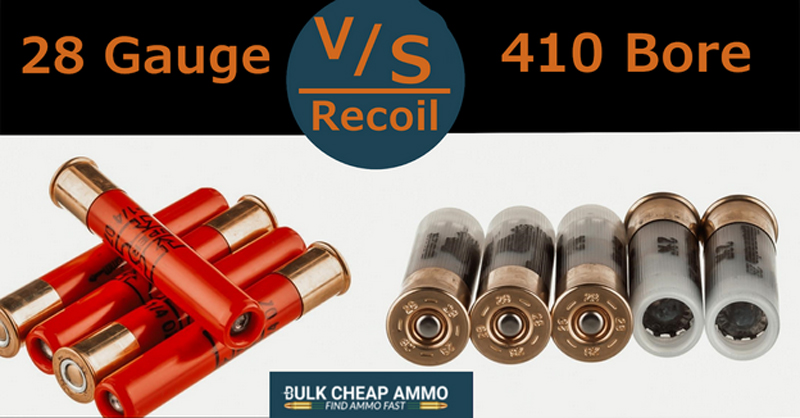.28 Gauge Vs 410 – Shotgun Cartridge Comparison. Which One Is Best?
It wasn't that long ago that people believed that bigger shotguns were always better. However, with a few new small-bore shotguns, many shooters and hunters are now reconsidering their options.
So, which is better: 28 gauge or .410 bore?
Keep reading to learn more about these two popular small-bore shotgun cartridges and decide which is right for you.

When choosing shotgun ammunition, there are many factors to consider, such as the type of game you want to hunt, the size, and your preferences. Two of the smallest shotgun gauges in common use are the 28 gauge and the 410. Both gauges have advantages and disadvantages, so it's important to understand their differences before deciding.
In this blog post, we will compare and contrast 28 gauge vs 410 in terms of their power, range, recoil, versatility, and availability. Keep scrolling to find out which ammo is best suited for hunting and shooting sports.
What Is The Difference Between 28 Gauge And 410 Bore?
The 28 gauge and 410 are two of the smallest shotgun gauges in common use. They are both popular for hunting and shooting sports, but they have different strengths and weaknesses.
28 gauge: The 28 gauge has a bore diameter of 0.545 inches, slightly larger than the 410's 0.410 inches. This means that the 28 gauge can hold more shot and powder, which results in a slightly higher velocity and more energy. This can benefit hunting larger game, such as rabbits, squirrels, and grouse. However, the 28 gauge also has more recoil than the 410, making shooting uncomfortable for some people.

410: The 410 has less recoil than the 28 gauge, making it a better choice for smaller shooters or those sensitive to recoil. However, the 410 also has less power than the 28 gauge, so it is not as effective for hunting large game. The 410 is a good choice for hunting small game, such as doves, quail, and rabbits. It is also a popular choice for self-defense and pest control.
| Feature | 28 Gauge | 410 |
| Bore diameter | 0.545 inches | 0.410 inches |
| Shell length | 2 3/4 inches to 3 inches | 2 1/2 inches to 3 inches |
| Shot size | 6 to 9 | 6 to 9 |
| Recoil | More | Less |
| Ballistics | Slightly higher velocity and more energy | Slightly lower velocity and less energy |
| Range | 30-40 yards | 20-30 yards |
| Stopping power | More | Less |
| Versatility | Versatile for a variety of hunting and shooting sports | Versatile for small game hunting and pest control |
.28 Gauge Vs 410: Cartridge Specs
As you can see, the .28 gauge is slightly larger than the .410 bore. The .28 gauge can hold more shot and powder, resulting in slightly higher muzzle energy and effective range. However, the .410 bore is lighter and has less recoil, making it a better choice for smaller or recoil-sensitive shooters.

Ultimately, your best choice will depend on your needs and preferences. If you are looking for a small-bore shotgun that is easy to shoot and has a good balance of power and range, then the .28 gauge is a good option. If you are looking for the lightest and most recoil-friendly option, then the .410 bore is a good choice.
| Feature | .28 Gauge | .410 Bore |
| Bore diameter | 0.545 inches | 0.410 inches |
| Shell length | 2 3/4 inches | 2 1/2 or 3 inches |
| Shot size | 6, 7 1/2, 8, or 9 | 6, 7 1/2, 8, or 9 |
| Muzzle energy | 1,000 to 1,400 foot-pounds | 800 to 1,200 foot-pounds |
| Effective range | Up to 40 yards | Up to 30 yards |
28 Gauge Vs 410: Recoil
As you can see, the .28 gauge has a slightly larger bore diameter than the .410 bore. This means the .28 gauge can hold more shot and powder, absorbing more recoil. As a result, the felt recoil is softer when shooting a .28 gauge shotgun than when shooting a .410 bore shotgun.
However, the difference in recoil between the two cartridges is not as significant as the difference in recoil between the .28 gauge and larger gauges, such as the 12 gauge. The 12 gauge has a bore diameter of 0.729 inches, much larger than the .28 gauge or .410 bore. This means that the 12 gauge can hold much more shot and powder, which results in a much more powerful recoil.

In general, you can expect the recoil of a .28 gauge shotgun to be about half that of a 12 gauge shotgun. The recoil of a .410-bore shotgun will be about two-thirds that of a 12-gauge shotgun.
It is important to note that the recoil of a shotgun cartridge can also be affected by the type of ammunition used. High-velocity ammunition will have more recoil than low-velocity ammunition.
If you are sensitive to recoil, consider using low-velocity ammunition in a .28 gauge shotgun. This will help reduce the felt recoil and make shooting easier.
Ultimately, the best way to determine which caliber is right for you is to try different shotguns and cartridges and see what feels comfortable.
28 Gauge Vs 410: Accuracy
.28 gauge is generally considered more accurate than the .410 bore. This is because the .28 gauge has a larger bore diameter, which allows it to hold more shot and powder. The extra shot and powder create a more powerful muzzle blast, which helps to propel the shot pellets more accurately.
The .410 bore is also a smaller cartridge, which can make it more difficult to control. This can lead to inaccurate shooting, especially at longer ranges.
However, it is important to note that the accuracy of a shotgun cartridge can also be affected by the type of ammunition used, the choke of the shotgun, and the shooter's skill.
If you are looking for a cartridge with good accuracy, then the .28 gauge is a good choice. However, if you are looking for a lightweight and recoil-friendly cartridge, then the .410 bore is a good option.
.28 Gauge Vs 410: Stopping Power
The .28 gauge has a muzzle energy of 1,000 to 1,400 foot-pounds, while the .410 bore has a muzzle energy of 800 to 1,200. This means the .28 gauge has about 20% more stopping power than the .410 bore.
However, it is important to note that stopping power is not the only factor determining whether a shotgun cartridge will effectively stop an attacker. The size of the target, the distance to the target, and the type of ammunition used also play a role.
If you are looking for a shotgun cartridge with the most stopping power, the .28 gauge is a good choice. However, if you are looking for a lightweight and recoil-friendly cartridge, then the .410 bore is a good option.
Ammo Cost & Availability
The ammo cost varies depending on the caliber, type, and manufacturer. The average price of .28 gauge ammo is $0.25 per round, while the average price of .410 bore ammo is $0.60 per round. However, these prices can fluctuate significantly depending on the retailer and ammo availability.
If you want to buy ammo, shopping around and comparing prices is important. You should also be prepared to buy ammo in bulk if you can find it. This will help you to save money in the long run.
Is 28 Gauge And 410 Good For Anything?
The 28 gauge and 410 are versatile shotgun calibers for various hunting and shooting sports. Here are some reasons why 28 gauge and 410 are popular for hunting and shooting sports:
- They have less recoil than larger gauges. This makes them a good choice for smaller shooters or those sensitive to recoil.
- They are available in a variety of shot sizes. This allows you to customize your shotgun for different types of games.
- They are affordable. 28 gauge and 410 shotguns are typically less expensive than larger gauges.
Final Words
However, there are some key differences between the two cartridges. The 28 gauge has a slightly larger bore diameter than the .410 bore, which means it can hold more shot and powder. This results in a higher muzzle velocity and muzzle energy, giving the 28 gauge a slightly longer effective range.
The .410 bore is lighter and has less recoil than the 28 gauge, making it a better choice for smaller shooters or those who are recoil-sensitive. It is also more affordable than the 28 gauge.
The best cartridge for you will depend on your individual needs and preferences. If you are looking for a cartridge with the most power and range, then the 28 gauge is a good choice. However, if you are looking for a lightweight and recoil-friendly cartridge, then the .410 bore is a good option.

